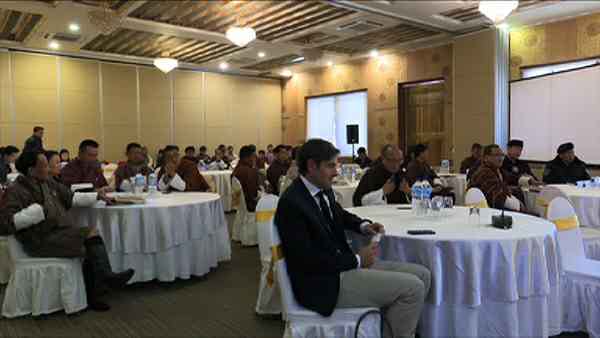With Bhutan well into the digitalization age , it is not spared from the risks of cyber exploitation. It is risker with not many aware of cyber crimes.
To create awareness on this important issue, the Ministry of Information and Communications (MoIC) in collaboration with International Telecommunication Unit (ITU) conducted a workshop to improve Cyber security and to develop the first National cyber security strategy in the country.
Cyber security is defined as the protection of computers, networks, programs and data from unauthorized access or attacks that are aimed for exploitation.
To ensure a high-level approach to cyber security, facilitator Dr. Marco Gercke, the director of Cybercrime Research Institute conducted a cyber security incident stimulation exercise for more than two hours. He said the exercise was not to scare anyone or put anyone under pressure, the idea is purely an ‘awareness rising’.
“The stimulation exercise may not totally prevent the systems from cyber attacks but it will provide a certain degree of guidance. Furthermore, it will give a good understanding on what could possibly happen to the country if such attacks happen.”
The MoIC Minister Karma Donnen Wangdi graced the workshop.

Since the introduction of internet in Bhutan in 1999, it has evolved from an information exchange platform to become the backbone of modern business, infrastructure and social network.
Today, many governments are transacting online and the internet is transforming how we socialize and do business. The reliance of our society on digital infrastructure is growing, where cyber space remains venerable. At the same time, methods used by malicious actors are rapidly evolving and Bhutan is not an exception for such attacks. “The current challenge Bhutan is facing is a lack of skills, knowledge and experience among Information and Communication Technology (ICT) professionals and in the area of cyber security,” said Lyonpo Karma Donnen Wangdi, MoIC.
Cyber attack is ranked as one of the biggest threat facing the business world today. An attack on a computer processing or communication network could cause 50 billion to 120 billion dollar of economic damage. “The focus is no longer on prevention, you can’t stop it, it is now about better detection and readiness for the inevitable in order to survive in today’s world,” commentator Deepika Rai said.
Dr. Marco Gercke, will be in the country for a week to discuss and engage with various stakeholders to establish Bhutan’s cyber security strategy. He will also discuss on child online protection, promote and improve institutional cyber culture and create awareness on cyber practice across government and business to enable all Bhutanese to be secure online. “We have been fortunate that such attacks have not happen and if such attacks happen, I don’t know if we have these mechanisms placed or not. And we are also trying to work on this,” said Jigme Thinley Namgyal, the director general of MoIC.
Today, Bhutan has Bhutan Computer Incident Response Team (BtCIRT), developed in 2016 which have dealt with over 250 incidences but it has not developed a holistic and comprehensive policy. “We are still venerable,” he added. The stimulation is a good way of sensationalizing the government, the executives and the internet user. The ministry is also planning to carry out similar exercise for other members very soon.
By Yeshey Choden
 BHUTAN TODAY The New Perspective
BHUTAN TODAY The New Perspective
